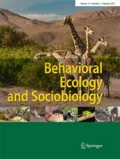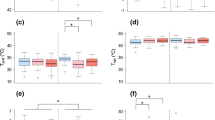Abstract
Many ectotherms reduce their exposure to changing thermal conditions using behavioral thermoregulation. The effectiveness of behavioral thermoregulation in maintaining ectotherm body temperatures within the target range is influenced not only by environmental (operative) temperatures but also by the presence of other con- and heterospecific individuals. How species’ interactions affect behavioral thermoregulation is largely unknown. Theory predicts that species’ interactions could affect the plasticity of behavioral thermoregulation in two ways, i.e., by developmental plasticity of a preferred temperature range or by an acute shift in body temperatures. Empirical tests of these predictions are scarce. We examined the developmental and acute effects of heterospecific social interactions on the accuracy and effectiveness of thermoregulation in the larvae of two competing species, Ichthyosaura alpestris and Lissotriton vulgaris. The presence of heterospecifics during larval development had no effect on preferred body temperatures but it modified later acute thermoregulatory responses to heterospecifics. Ichthyosaura alpestris larvae from heterospecific tanks increased their thermoregulatory accuracy and effectiveness, while L. vulgaris larvae from conspecific tanks relaxed their thermoregulatory efforts. The thermal dependence of somatic growth suggests that modified behavioral thermoregulation has the potential to accelerate growth in competitively dominant I. alpestris. Acute thermoregulatory responses are affected by heterospecific social interactions in newt larvae, but not conspecific. A developmental plastic response modified body temperatures not the target thermoregulatory range, which shows that the influence of heterospecific social interactions is more complex than predicted by theory. Species interactions complicate estimating an ectotherm’s vulnerability to ongoing climate change.
Significance statement
Many ectothermic animals control their body temperature through behavioral thermoregulation. Their thermoregulatory decisions are influenced not only by environmental temperatures, but also by the presence of other species. We show that the current thermoregulatory effort in interacting newt larvae is affected by previous experience with competing species. The influence of heterospecific social interactions is more complex than predicted by theory, which complicates estimating an ectotherm’s vulnerability to ongoing climate change.




Similar content being viewed by others
References
Angilletta MJ (2009) Thermal adaptation: a theoretical and empirical synthesis. Oxford University Press, Oxford
Babik W (1998) Intrageneric predation in larval newts (Triturus, Salamandridae, Urodela). Amphibia-Reptilia 19:446–451. https://doi.org/10.1163/156853898X00133
Blouin-Demers G, Nadeau P (2005) The cost-benefit model of thermoregulation does not predict lizard thermoregulatory behavior. Ecology 86:560–566. https://doi.org/10.1890/04-1403
Blouin-Demers G, Weatherhead PJ (2001) Thermal ecology of black rat snakes (Elaphe obsoleta) in a thermally challenging environment. Ecology 82:3025–3043. https://doi.org/10.1890/0012-9658(2001)082[3025:TEOBRS]2.0.CO;2
Boukal D (2014) Trait- and size-based descriptions of trophic links in freshwater food webs: current status and perspectives. J Limnol 73:171–185. https://doi.org/10.4081/jlimnol.2014.826
Braz E, Joly P (1994) Microhabitat use, resource partitioning and ecological succession in a size-structured guild of newt larvae (Triturus, Caudata, Amphibia). Arch Hydrobiol 131:129–139
Brockhurst MA, Koskella B (2013) Experimental coevolution of species interactions. Trends Ecol Evol 28:367–375. https://doi.org/10.1016/j.tree.2013.02.009
Buckley LB, Nufio CR, Kingsolver JG (2014) Phenotypic clines, energy balances and ecological responses to climate change. J Anim Ecol 83:41–50. https://doi.org/10.1111/1365-2656.12083
Canty A, Ripley B (2017) Boot: bootstrap R (S-plus) functions. R package version 1.3–19, https://cran.r-project.org/web/packages/boot/index.html
Denny MW (1993) Air and water. The biology and physics of life’s media. Princeton University Press, Princeton, NY
Dodd CK, Seigel RA (1991) Relocation, repatriation, and translocation of amphibians and reptiles: are they conservation strategies that work? Herpetologica 47:336–350
Downes S, Bauwens D (2002) An experimental demonstration of direct behavioural interference in two Mediterranean lacertid lizard species. Anim Behav 63:1037–1046. https://doi.org/10.1006/anbe.2002.3022
Downes S, Shine R (1998) Heat, safety or solitude? Using habitat selection experiments to identify a lizard’s priorities. Anim Behav 55:1387–1396. https://doi.org/10.1006/anbe.1997.0705
Dvořák J, Gvoždík L (2010) Adaptive accuracy of temperature oviposition preferences in newts. Evol Ecol 24:1115–1127. https://doi.org/10.1007/s10682-010-9355-8
Earl JE, Whiteman HH (2015) Are commonly used fitness predictors accurate? A meta-analysis of amphibian size and age at metamorphosis. Copeia 103:297–309. https://doi.org/10.1643/CH-14-128
Ghalambor CK, McKay JK, Carroll SP, Reznick DN (2007) Adaptive versus non-adaptive phenotypic plasticity and the potential for contemporary adaptation in new environments. Funct Ecol 21:394–407. https://doi.org/10.1111/j.1365-2435.2007.01283.x
Gvoždík L (2012) Plasticity of preferred body temperatures as means of coping with climate change? Biol Lett 8:262–265. https://doi.org/10.1098/rsbl.2011.0960
Gvoždík L (2015) Mismatch between ectotherm thermal preferenda and optima for swimming: a test of the evolutionary pace hypothesis. Evol Biol 42:137–145. https://doi.org/10.1007/s11692-015-9305-z
Gvoždík L, Kristín P (2017) Economic thermoregulatory response explains mismatch between thermal physiology and behavior in newts. J Exp Biol 220:1106–1111. https://doi.org/10.1242/jeb.145573
Gvoždík L, Smolinský R (2015) Body size, swimming speed, or thermal sensitivity? Predator-imposed selection on amphibian larvae. BMC Evol Biol 15(238). https://doi.org/10.1186/s12862-015-0522-y
Gvoždík L, Černická E, Van Damme R (2013) Predator-prey interactions shape thermal patch use in a newt larvae-dragonfly nymph model. PLoS One 8:e65079. https://doi.org/10.1371/journal.pone.0065079
Hadamová M, Gvoždík L (2011) Seasonal acclimation of preferred body temperatures improves the opportunity for thermoregulation in newts. Physiol Biochem Zool 84:166–174. https://doi.org/10.1086/658202
Hertz PE, Huey RB, Stevenson RD (1993) Evaluating temperature regulation by field-active ectotherms: the fallacy of the inappropriate question. Am Nat 142:796–818. https://doi.org/10.1086/285573
Hloušková M, Balogová M, Kršáková V, Gvoždík L (2018) No trade-offs in interspecific interference ability and predation susceptibility in newt larvae. Ecol Evol 8:9095–9104. https://doi.org/10.1002/ece3.4465
Huey RB, Slatkin M (1976) Cost and benefits of lizard thermoregulation. Q Rev Biol 51:363–384. https://doi.org/10.1086/409470
Huey RB, Hertz P, Sinervo B (2003) Behavioral drive versus behavioral inertia in evolution: a null model approach. Am Nat 161:357–366. https://doi.org/10.1086/346135
Huey RB, Kearney MR, Krockenberger A, Holtum JAM, Jess M, Williams SE (2012) Predicting organismal vulnerability to climate warming: roles of behaviour, physiology and adaptation. Philos Trans R Soc B 367:1665–1679. https://doi.org/10.1098/rstb.2012.0005
IUPS Thermal Commission (2003) Glossary of terms for thermal physiology. J Therm Biol 28:75–106. https://doi.org/10.1016/S0306-4565(02)00055-4
Kearney M, Shine R, Porter WP (2009) The potential for behavioral thermoregulation to buffer "cold-blooded" animals against climate warming. Proc Natl Acad Sci U S A 106:3835–3840. https://doi.org/10.1073/pnas.0808913106
Kuzmin SL (1991) Food resource allocation in larval newt guilds (genus Triturus). Amphibia-Reptilia 12:293–304. https://doi.org/10.1163/156853891X00455
Labra A, Pienaar J, Hansen TF (2009) Evolution of thermal physiology in Liolaemus lizards: adaptation, phylogenetic inertia, and niche tracking. Am Nat 174:204–220. https://doi.org/10.1086/600088
Little A, Seebacher F (2016) Acclimation, acclimatization and seasonal variation in amphibians and reptiles. In: de Andrade DV, Bevier CR, de Carvalho JE (eds) Amphibian and reptile adaptations to the environment: interplay between physiology and behavior, 1st edn. CRC Press, Boca Raton, pp 41–62
Lutterschmidt WI, Hutchison VH (1997) The critical thermal maximum: data to support the onset of spasms as the definitive end point. Can J Zool 75:1553–1560. https://doi.org/10.1139/z97-782
Magnuson JJ, Crowder LB, Medvick PA (1979) Temperature as an ecological resource. Am Zool 19:331–343. https://doi.org/10.1093/icb/19.1.331
Marek V, Gvoždík L (2012) The insensitivity of thermal preferences to various thermal gradient profiles in newts. J Ethol 30:35–41. https://doi.org/10.1007/s10164-011-0287-8
Měráková E, Gvoždík L (2009) Thermal acclimation of swimming performance in newt larvae: the influence of diel temperature fluctuations during embryogenesis. Funct Ecol 23:989–995. https://doi.org/10.1111/j.1365-2435.2009.01588.x
Mitchell WA, Angilletta MJ (2009) Thermal games: frequency-dependent models of thermal adaptation. Funct Ecol 23:510–520. https://doi.org/10.1111/j.1365-2435.2009.01542.x
Moran NA (1992) The evolutionary maintenance of alternative phenotypes. Am Nat 139:971–989. https://doi.org/10.1086/285369
Muñoz MM, Stimola MA, Algar AC, Conover A, Rodriguez AJ, Landestoy MA, Bakken GS, Losos J (2014) Evolutionary stasis and lability in thermal physiology in a group of tropical lizards. Proc R Soc B 281:20132433. https://doi.org/10.1098/rspb.2013.2433
Northfield TD, Ives AR (2013) Coevolution and the effects of climate change on interacting species. PLoS Biol 11:e1001685. https://doi.org/10.1371/journal.pbio.1001685
Padilla DK, Adolph SC (1996) Plastic inducible morphologies are not always adaptive: the importance of time delays in a stochastic environment. Evol Ecol 10:105–117. https://doi.org/10.1007/BF01239351
Peiman KS, Robinson BW (2010) Ecology and evolution of resource-related heterospecific aggression. Q Rev Biol 85:133–158. https://doi.org/10.1086/652374
Piasečná K, Pončová A, Tejedo M, Gvoždík L (2015) Thermoregulatory strategies in an aquatic ectotherm from thermally-constrained habitats: an evaluation of current approaches. J Therm Biol 52:97–107. https://doi.org/10.1016/j.jtherbio.2015.06.007
Polis GA, Myers CA, Holt RD (1989) The ecology and evolution of intraguild predation: potential competitors that eat each other. Annu Rev Ecol Syst 20:297–330. https://doi.org/10.1146/annurev.es.20.110189.001501
Regal PJ (1971) Long term studies with operant conditioning techniques of temperature regulation studies in reptiles. J Physiol Paris 63:403–406
Richards-Zawacki CL (2010) Thermoregulatory behaviour affects prevalence of chytrid fungal infection in a wild population of Panamanian golden frogs. Proc R Soc Lond B 277:519–528. https://doi.org/10.1098/rspb.2009.1656
Rusch T, Angilletta MJ (2017) Competition for thermal resources between lizards alters thermoregulatory behavior and hormone levels. Funct Ecol 31:1519–1528. https://doi.org/10.1111/1365-2435.12869
Seebacher F, Grigg GC (1997) Patterns of body temperature in wild freshwater crocodiles, Crocodylus johnstoni: thermoregulation versus thermoconformity, seasonal acclimatization, and the effect of social interactions. Copeia 1997:549–557. https://doi.org/10.2307/1447558
Semlitsch R (2002) Critical elements for biological based recovery plans of aquatic-breeding amphibians. Conserv Biol 16:619–629. https://doi.org/10.1046/j.1523-1739.2002.00512.x
Smolinský R, Gvoždík L (2009) The ontogenetic shift in thermoregulatory behaviour of newt larvae: testing the “enemy-free temperatures” hypothesis. J Zool 279:180–186. https://doi.org/10.1111/j.1469-7998.2009.00603.x
Smolinský R, Gvoždík L (2012) Interactive influence of biotic and abiotic cues on the plasticity of preferred body temperatures in a predator-prey system. Oecologia 170:47–55. https://doi.org/10.1007/s00442-012-2283-2
Snell-Rood EC (2013) An overview of the evolutionary causes and consequences of behavioural plasticity. Anim Behav 85:1004–1011. https://doi.org/10.1016/j.anbehav.2012.12.031
Sunday JM, Bates AE, Kearney MR, Colwell RK, Dulvy NK, Longino JT, Huey RB (2014) Thermal-safety margins and the necessity of thermoregulatory behavior across latitude and elevation. Proc Natl Acad Sci U S A 111:5610–5615. https://doi.org/10.1073/pnas.1316145111
Szymura JM (1974) Competitive situation in larvae of four sympatric species of newts (Triturus cristatus, T. alpestris, T. montandoni, and T. vulgaris) living in Poland. Acta Biol Cracov 17:235–262
Tattersall GJ, Luebbert JP, Le Pine OK, Ormerod KG, Mercier AJ (2012) Thermal games in crayfish depend on establishment of social hierarchies. J Exp Biol 215:1892–1904. https://doi.org/10.1242/jeb.065946
Thompson JN (2005) The geographic mosaic of coevolution. University of Chicago Press, Chicago
Toufarová E, Gvoždík L (2016) Do female newts modify thermoregulatory behavior to manipulate egg size? J Therm Biol 57:72–77. https://doi.org/10.1016/j.jtherbio.2016.02.001
Tuff KT, Tuff T, Davies KF (2016) A framework for integrating thermal biology into fragmentation research. Ecol Lett 19:361–374. https://doi.org/10.1111/ele.12579
Van Buskirk J (2007) Body size, competitive interactions, and the local distribution of Triturus newts. J Anim Ecol 76:559–567. https://doi.org/10.1111/j.1365-2656.2007.01218.x
Van Buskirk J, Schmidt BR (2000) Predator-induced phenotypic plasticity in larval newts: trade-offs, selection, and variation in nature. Ecology 81:3009–3028. https://doi.org/10.1890/0012-9658(2000)081[3009:PIPPIL]2.0.CO;2
Werner EE, Gilliam JF (1984) The ontogenetic niche and species interactions in size-structured populations. Annu Rev Ecol Syst 15:393–425. https://doi.org/10.1146/annurev.es.15.110184.002141
Williams SE, Shoo LP, Isaac JL, Hoffmann AA, Langham G (2008) Towards an integrated framework for assessing the vulnerability of species to climate change. PLoS Biol 6:e325. https://doi.org/10.1371/journal.pbio.0060325
Acknowledgments
We thank C. R. Gabor and anonymous reviewers for their comments on the previous version of this paper; we would also thank P. Kristín for his help with the realization of seminatural experiment.
Funding
This research was supported by the Czech Science Foundation (grant numbers 15-07140S and 17-15480S to LG) and the Institute of Vertebrate Biology AS CR (RVO: 68081766 to LG).
Author information
Authors and Affiliations
Corresponding author
Ethics declarations
Conflict of interest
The authors declare that they have no conflict of interest.
Ethical approval
All applicable international, national, and/or institutional guidelines for the use of animals were followed. All experimental procedures were approved by the Expert Committee for Animal Conservation of the Institute of Vertebrate Biology AS CR (research protocol no. 135/2016). The Agency for Nature Conservation and Landscape Protection of the Czech Republic issued permission to capture the newts (1154/ZV/2008).
Additional information
Communicated by C. R. Gabor
Electronic supplementary material
ESM 1
(DOC 19 kb)
Rights and permissions
About this article
Cite this article
Winterová, B., Gvoždík, L. Influence of interspecific competitors on behavioral thermoregulation: developmental or acute plasticity?. Behav Ecol Sociobiol 72, 169 (2018). https://doi.org/10.1007/s00265-018-2587-2
Received:
Revised:
Accepted:
Published:
DOI: https://doi.org/10.1007/s00265-018-2587-2




